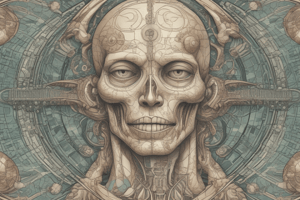Podcast
Questions and Answers
Which structure is highlighted?
Which structure is highlighted?
- Suprarenal medulla
- Tail of pancreas
- Infundibulum of pituitary (correct)
- Pituitary gland
Which structure is highlighted?
Which structure is highlighted?
- Infundibulum of pituitary
- Pituitary gland
- Suprarenal medulla
- Tail of pancreas (correct)
Which structure is highlighted?
Which structure is highlighted?
- Testes
- Suprarenal medulla (correct)
- Hypothalamus
- Ovary
Fill in the blanks regarding the anatomical description of the pancreas. Then place the sentences in order to make a coherent paragraph.
Fill in the blanks regarding the anatomical description of the pancreas. Then place the sentences in order to make a coherent paragraph.
Which structure is highlighted?
Which structure is highlighted?
Which structure is highlighted?
Which structure is highlighted?
Which structure is highlighted?
Which structure is highlighted?
Which structure is highlighted?
Which structure is highlighted?
Place the appropriate hormones in the glands they are secreted from.
Place the appropriate hormones in the glands they are secreted from.
Fill in the following sentences describing the different parts of the suprarenal (adrenal) gland. Then place the sentences in order from superficial to deep.
Fill in the following sentences describing the different parts of the suprarenal (adrenal) gland. Then place the sentences in order from superficial to deep.
Which structure is highlighted?
Which structure is highlighted?
Which structure is highlighted?
Which structure is highlighted?
What occurs when hormones reach their target cells?
What occurs when hormones reach their target cells?
What are the two main targets of antidiuretic hormone (ADH)?
What are the two main targets of antidiuretic hormone (ADH)?
What stimulates the secretion of parathyroid hormone from the parathyroid gland?
What stimulates the secretion of parathyroid hormone from the parathyroid gland?
Antidiuretic hormone (known as ADH or vasopressin)...
Antidiuretic hormone (known as ADH or vasopressin)...
Which pancreatic islet cell type is correctly matched with its product?
Which pancreatic islet cell type is correctly matched with its product?
The hypothalamus is sometimes referred to as the 'master control center' of the endocrine system because it...
The hypothalamus is sometimes referred to as the 'master control center' of the endocrine system because it...
Flashcards are hidden until you start studying
Study Notes
Endocrine System Overview
- The infundibulum connects the pituitary gland to the hypothalamus.
- The tail of the pancreas is one of its three regions: head, body, and tail.
- The suprarenal medulla plays a critical role in the stress response by secreting catecholamines.
Endocrine Structures
- The pituitary gland is often referred to as the "master gland" due to its regulation of other endocrine glands.
- The testes are male reproductive organs that produce hormones like testosterone.
- The pineal gland regulates sleep-wake cycles through melatonin secretion.
- Ovaries are female reproductive organs that produce estrogen and progesterone.
- The hypothalamus is a crucial brain region that controls various endocrine functions.
Hormones and Endocrine Functions
- Hormones travel through the bloodstream to exert effects on target cells.
- The two main targets of antidiuretic hormone (ADH) are the kidneys and blood vessels.
- Aldosterone, a lipid-soluble hormone, regulates sodium and potassium levels in the blood.
- Parathyroid hormone, secreted by chief cells in the parathyroid glands, increases blood calcium levels.
Pancreas and Its Functions
- The pancreas functions both as an endocrine and exocrine gland.
- Endocrine functions include insulin and glucagon secretion from pancreatic islets.
- Pancreatic acinar cells are responsible for producing digestive enzymes.
Adrenal Glands
- Suprarenal glands (adrenal glands) sit atop the kidneys and consist of two parts: cortex and medulla.
- The adrenal cortex produces corticosteroids, while the medulla secretes epinephrine and norepinephrine for the fight-or-flight response.
Thyroid Gland
- The thyroid gland has a narrow isthmus connecting its lobes, essential for producing thyroid hormones.
- The conversion of iodide to iodine occurs in the thyroid follicle lumen, which is crucial for hormone synthesis.
- Thyroid hormones stimulate the release of growth hormone (GH) from the anterior pituitary.
Hormone Actions and Mechanisms
- Hormonal communication often initiates from sensory input leading to hormone release.
- G-proteins, located at the inner side of membrane receptors, are crucial for hormone signaling involving three subunits.
- Changes in conformation of G-proteins occur upon ligand binding to receptors, leading to intracellular signaling cascades.
Key Facts
- The anterior pituitary is linked to the hypothalamus via the hypothalamo-hypophyseal portal system.
- Parathyroid glands typically number between 2-6 and are located on the posterior surface of the thyroid gland.
- Iodinated thyroglobulin can be stored in thyroid follicles for 2-3 months, ensuring a reserve for hormonal production when needed.
Studying That Suits You
Use AI to generate personalized quizzes and flashcards to suit your learning preferences.




